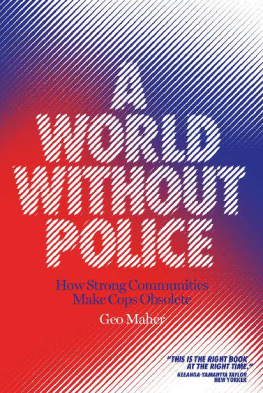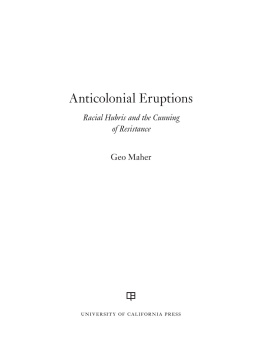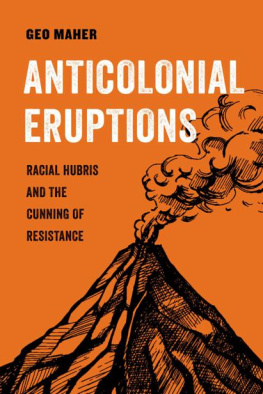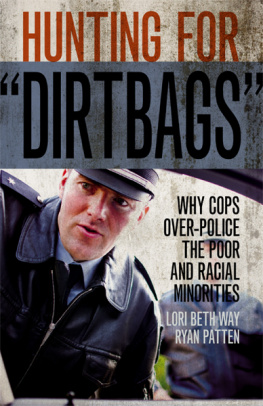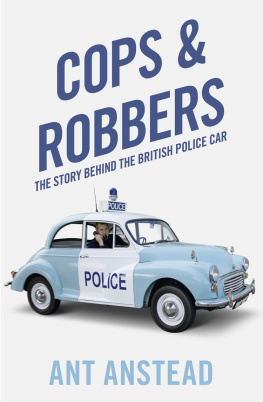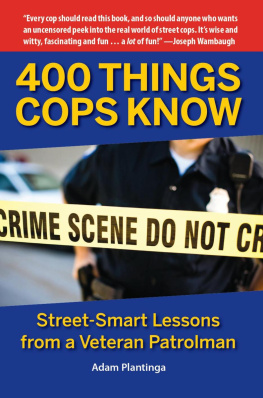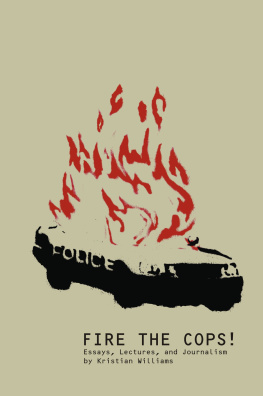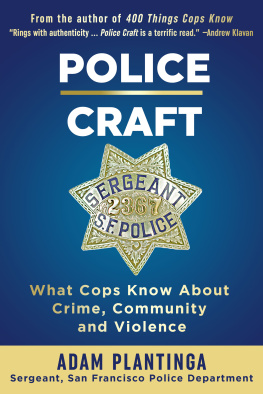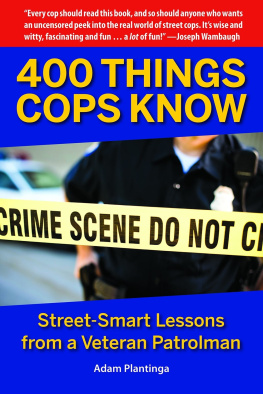The uprising against the police in the summer of 2020 showed the United States, if not the world, what Black America has always known: the police are an enduring force of oppression and violence. Geo Mahers new book not only provides us the tools to understand the role of the police but the imagination to conceive of a world without them. This is the right book at the right time. Keeanga-Yamahtta Taylor, From #BlackLivesMatter to Black Liberation
An essential introduction to the case for abolishing the police. Publishers Weekly
From the ashes of the Third Precinct, Geo Maher looks for what grows when the deadly shadow of the police is removed. He writes an urgent history of the present. The ingredients of white supremacy, colonialism, and capitalism are baked into the cake called America, especially the institution of the police. You cant unbake that cake. Maher contends creating a world without police is not only possible, but necessary. Nick Estes, Our History is the Future
A World Without Police is provocative in the best possible ways: It dares the reader to imagine a future only without policing, but shorn of the capitalism and white supremacy that refashions a public in the image of the police. It situates the carceral and coercive institutions in the US within broader global currents of imperial violence. And it demands that we together build strong, antiracist, and egalitarian communities that can defend themselves here and across national boundaries. Laleh Khalili, Sinews of War and Trade
Thanks to the tireless organizing work of the stubborn agitators, zealots, and fanatics of the best sort who inspire Geo Maher, police abolition is an increasingly widespread political demand. A World Without Police dismantles every argument cops and their supporters offer to defend our present world with police, incisively detailing their flaws and falsehoods. In our future world without police, Mahers persuasive book will serve as the institutions autopsy report. Stuart Schrader, Badges Without Borders
A clear-sighted and passionate case for abolition that is ultimately an argument for changing the world as we know it. Mahers work is steeped in historical understanding and revolutionary insight, but it is, above all, determinedly hopeful and humane in its vision of another way of living together that is absolutely possible. Priyamvada Gopal, Insurgent Empire
Mahers prose, trenchant and unapologetic, helps us write a poetry of abolition. Tyler Wall, Police: A Field Guide
Well never be free as long as cops patrol our streets, and Geo Mahers book helps light our way in our struggle to build a world free from the plague of police. David Correia, Police: A Field Guide
In A World Without Police , Geo Maher considers modern day abolitionist movements against policing. Through the flames of the 2020 uprisings, he illuminates a long history of abolitionist struggles for freedom, for democracy, and for the radical transformation of the world. An urgent text for our times. Christina Heatherton, Policing the Planet
A World Without Police analyzes the unfinished business of abolition democracy in the twenty-first century. Amid a cycle of rebellion, Geo Maher deftly illuminates how policing is a racket. The power to transform society, he argues, lies in the visions of radical democratic movements to abolish the police. Jordan Camp, Incarcerating the Crisis
A World Without Police
How Strong Communities
Make Cops Obsolete
Geo Maher
First published by Verso 2021
Geo Maher 2021
All rights reserved
The moral rights of the author have been asserted
1 3 5 7 9 10 8 6 4 2
Verso
UK: 6 Meard Street, London W1F 0EG
US: 20 Jay Street, Suite 1010, Brooklyn, NY 11201
versobooks.com
Verso is the imprint of New Left Books
ISBN-13: 978-1-83976-005-1
ISBN-13: 978-1-83976-008-2 (UK EBK)
ISBN-13: 978-1-83976-007-5 (US EBK)
British Library Cataloguing in Publication Data
A catalogue record for this book is available from the British Library
Library of Congress Cataloging-in-Publication Data
Library of Congress Control Number: 2021937561
Typeset in Sabon by Biblichor Ltd, Edinburgh
Printed and bound by CPI Group (UK) Ltd, Croydon CR0 4YY
Contents
It was 9:53 p.m. on May 28, 2020, and Minneapoliss Third Police Precinct was surrounded. Hundreds of protesters, furious at the police killing of George Floyd three days earlier, had established a siege, flanking the building from the front, before then encircling it from the back as well. The panic on the police channels was palpable: Our front doors fully breached Theyre coming in, theyre coming in the back We need to move, we need to move! Minutes later, police would abandon the precinct entirely, lobbing stun grenades and firing rubber bullets indiscriminately into the crowd before ramming a police SUV through the rear gate. Nine more vehicles followed amid a phalanx of officers on foot, fleeing under a hail of rocks and bottles punctuated by the occasional soft whoosh of roman candles. The precinct was soon fully ablaze.
To burn a building or a car is, like the riot itself, a form of communication. Too often, however, the enemy is out of reach, and so fires are lit for attention, to grab the headlines, or quite simply because nothing else has workeda desperate bid to puncture the barrier between those who are and are not heard, those who matter and those who dont. Many buildings would burn that night and in the days that followed, but the Third Precinct was something different. Protesters had taken an enemy outpost, the direct object of their fury, and they had destroyed it. To burn down a police station was one thing; to do so together , as an act of collective mourning and celebration, was another thing entirely, and it was glorious indeed. So direct was the correspondence between the violence inflicted on George Floyd and the retaliation by protesters that, at the time, some 54 percent of Americans felt their actions were justified.
In front of the burning precinct, the scene was euphoric. Widely circulated images of the gathered crowds tell us much about those who would come to lead the George Floyd rebellions nationwide. Some faces, many masks. Multiracial, but mostly Black. Multigenerational, but mostly teenagers and Gen Z zoomers abandoned by the greed and fear of a dying white world. Those who might once have expected a level of comfort and security that is no longer possible, and those taught for centuries to expect very little, if anythingthe holders of empty promissory notes, and the holders of nothing at all, in the words of Joshua Clover. But their exuberant faces betrayed more than fury at broken promises and rage at yet another brazen police murder: it gave us a glimpse of a different kind of world. And the parameters of that new world came immediately into focus. As protests leapt across the country like climate changeinduced wildfires, grassroots pressure nationwide crystallized in an unprecedented way around a nearly unanimous demand: to defund and abolish the police.
Minneapolis is no stranger to police violencethe name Jamar Clark, shot dead in 2015, still rings loudly in our ears, as does that of Philando Castile, killed in 2016 in a nearby suburb. But it still came as a shock when city council president Lisa Bender tweeted dramatically on June 4: We are going to dismantle the Minneapolis Police Department and replace it with a transformative new model of public safety. Flanked by councilors Jeremiah Ellison and Alondra Cano, Bender soon unveiled a veto-proof majority promising to make good on the plan. Cano describes her own realization, upon seeing the video of George Floyds murder, that the Minneapolis Police Department was never going to be repairable. She had seen police reform in practice, had heard the department lauded by Obamas police reform czars, and it still came to this: MPD officer Derek Chauvins knee on George Floyds neck. For nine eternal minutes. No amount of cultural sensitivity or use of force training had prevented it. The current system of policing, Cano now realized, was the product of slavery and colonization, and no amount of reform had been able to change its fundamental nature. This, she explained, is why so many of us are unflinchingly committed to deconstructing that system altogether and creating a new system from the ground up with our communities. To do so, she insisted, doesnt mean abolishing safety. Were not abolishing protection. Were abolishing a broken system.


